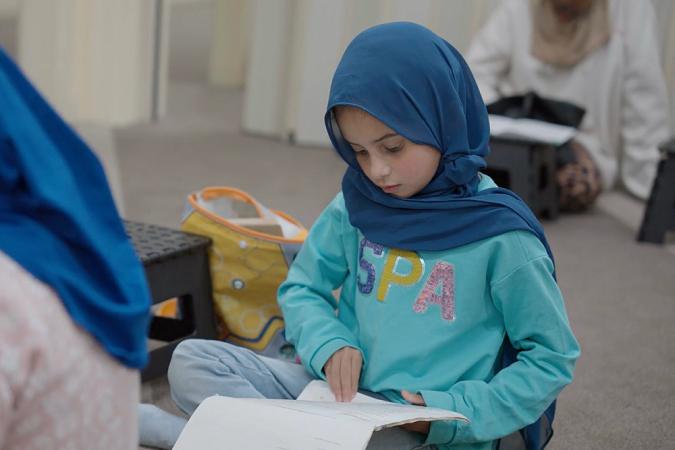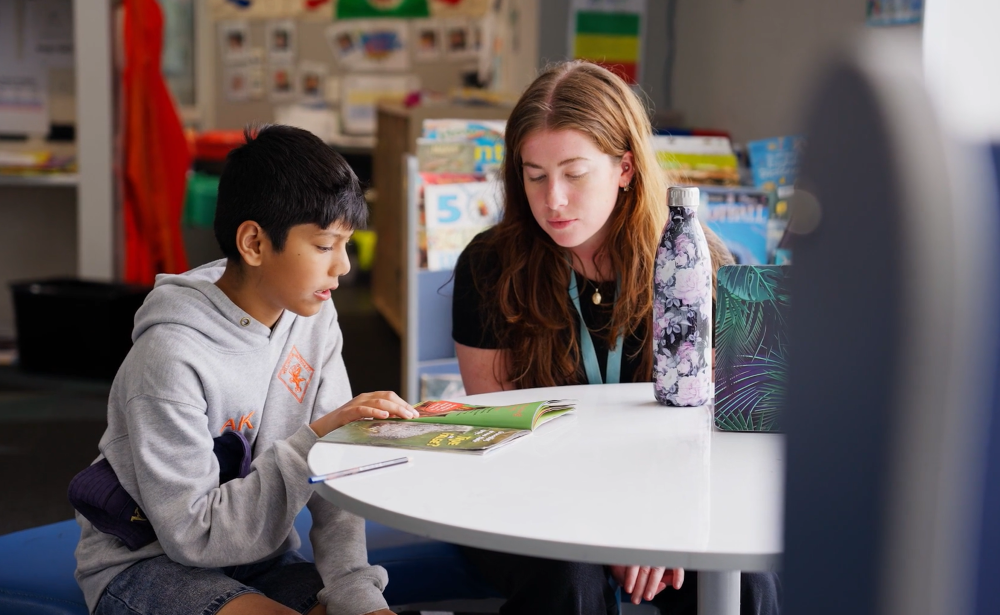Understanding Muslim identity in Aotearoa
This resource contains teacher support materials and suggested activities to help students understand important ideas about the cultures and collective identities of Muslim people in Aotearoa New Zealand.

About this resource
These resources (years 1–10) unpack the Know context (Ngā ahurea me ngā tuakiri kiritōpū | Cultures and collective identities) in relation to two videos - Anzar's Story and Nurah and Hamza's Story - that tell about their experiences growing up as Muslims in Aotearoa New Zealand.
The suggested activities are intended as examples to help students understand important ideas about the cultures and collective identities of Muslim people in Aotearoa New Zealand.
Students will use the skills they have developed through these learning experiences to find out about the stories of Muslim groups in their own communities and promote social cohesion.
Revisiting the same concepts and skills in different contexts helps students develop their abilities in the Do practices in more complex and critical ways, which in turn deepens their understanding of the big ideas.
Understanding Muslim identity in Aotearoa
Anzar’s story
Nurah and Hamza’s story
Teacher support materials
See Materials that come with this resource to download:
- Understanding Muslim identity in Aotearoa Y1-3 TSM (.pdf)
- Understanding Muslim identity in Aotearoa Y4-6 TSM (.pdf)
- Understanding Muslim identity in Aotearoa Y7-8 TSM (.pdf)
- Understanding Muslim identity in Aotearoa Y9-10 TSM (.pdf)

This resource is designed to support social cohesion in Aotearoa New Zealand, by teaching about Muslims who call Aotearoa New Zealand, home.
These tips are designed for teachers who want to support Muslim students in the classroom to feel safe, included, and that they belong.
Prayers
- Students who request to perform their daily prayers during school time may require a clean, quiet, private place to do so. Parents may appreciate the support for their children to pray when needed (for example, at camps).
- Prayer times vary according to the position of the sun and will change with daylight savings and as daylight hours change throughout the year.
- Friday midday prayer is a special weekly prayer, which is an obligation for Muslim males. Some older students (for example, 12-year-olds and older) may want to pray Friday midday prayers at the local mosque. Teachers could have a conversation with whānau if these students miss lessons because of the Friday prayers and provide opportunities for them to catch up on lessons as required.
- Please understand that if prayers or karakia that refer to particular deities are recited at school, Muslim students may prefer not to participate. It is good practice to consider alternatives that are inclusive for all ākonga.
Learning
- Consider how you can ensure the learning in your school is inclusive for all students. For example, there are Muslim girls who do not want to wear togs in front of boys when swimming.
- Muslims in Aotearoa New Zealand, are very diverse, and each family will have different expectations and desires for their children. This may be influenced by the education systems they are familiar with. So it is important not to make assumptions.
- As the teacher, you will know your students well and will identify those who are Muslims. Some students will be very happy to share their experiences and beliefs, while others will prefer not to. It is good practice to check in with Muslim students and their whānau before teaching this resource to find out what they would like to occur during the learning experience.
Relationships
- Muslims have high regard for teachers. Most Muslim families would love to meet with their child’s teacher to discuss how best to support their child.
- Muslims in Aotearoa New Zealand, are very diverse, and their practices or interpretations of Islamic guidelines may differ based on their backgrounds, cultures, family traditions, and personal choices. It is important not to make presumptions.
- Many Muslims have particular rules for interactions across genders. When meeting whānau of a different gender, please note that some people may choose not to have physical contact, such as handshaking. A good practice is to pause and let the whānau member lead. If they prefer not to shake hands, you could smile and greet them with “Assalaamu alaykum”, pronounced like “us-sah-lahm ah-laykom” (meaning "peace be upon you"), while holding your hand over your heart. Muslims may also avoid direct eye contact as a sign of respect while still listening to what you are saying.
- Many of your students’ families may have a dominant or preferred language other than English. When meeting or communicating with these whānau, considerations should be given to language and whether translations and interpreting support may be needed. Schools can use their ESOL funding or, if relevant, refugee funding to access paid interpreting services. It is not advisable to rely on their children as interpreters.
Food
- Many Muslims eat halal food, which is food prepared in accordance with Islamic guidelines. Ensure any food provided in the classroom or school has halal options or offers halal alternatives (for example, vegan, vegetarian, seafood, or kosher). This may exclude some foods, for example, lollies that have non-halal gelatine. Many cities in Aotearoa New Zealand, have halal butcheries that could provide halal products (for example, sausages for sausage sizzles), which would also meet the needs of a wide range of ākonga.
Religious rituals and events
- Ramadan is a month on the Islamic calendar, observed by Muslims worldwide as a month of fasting, prayer, reflection, and community. During Ramadan, many Muslims choose to fast from food and liquids during daylight hours. They may also be very busy after school hours during this month, as it is a time of prayer, fellowship, and worship. Students who fast may prefer not to partake in physical activity and may have less energy than usual. Scheduling school events that involve food during the month of Ramadan may exclude some Muslim whānau and ākonga. At the end of Ramadan, Muslim communities will celebrate Eid (a day of celebration to mark the end of Ramadan) and will likely see Muslim students away from school.
- Some Muslim whānau and ākonga may hesitate to participate in school celebrations or other holidays, such as Christmas, Easter, and Halloween.
Further support
For an opportunity to read and learn more about Islam:
For language and interpretation support:
- Unlocking Language Barriers | Te Whakamahea Tauārai Reo | Ministry for Ethnic Communities
- Digi Language Support (DLS) Services (telephone and online interpreting)
- Interpreting New Zealand (in person)
Schools can also contact their local (regional) Ministry office and ask for Senior Adviser, Refugee Migrant Support, if you’d like further advice on how to connect with whānau.
See Materials that come with this resource to download Understanding Muslim identity in Aotearoa Tips for teachers and schools (.pdf).
Allah: The Arabic word for God, used by Muslims to refer to the one and only God.
Arabic: The language used for religious and sacred purposes in Islam, as it is the language in which the Qur’an was revealed to the prophet Muhammad.
Asr: One of the five daily prayers performed by Muslims, which takes place in the afternoon.
Assalaamu alaykum: A common Arabic greeting that means “peace be upon you”. The response to this greeting is "Wa alaykum assalaam", meaning “and upon you be peace”.
Dhuhr: One of the five daily prayers performed by Muslims, which takes place just after noon.
Du'a: A prayer or supplication made to God in Islam.
Eid: A Muslim holiday that celebrates the end of Ramadan, the month of fasting. There is also another Eid at the time of the annual pilgrimage to Mecca, Saudi Arabia.
Fajr: One of the five daily prayers performed by Muslims, which takes place just before dawn.
Hadith: A collection of sayings and actions of the prophet Muhammad that serve as a source of guidance and inspiration for Muslims.
Hajj: The annual Muslim pilgrimage to Mecca. Muslims should perform this once in their lifetime if they are physically and financially able to undertake it safely.
Halal: Refers to food, drink, and other products that are considered permissible under Islamic law.
Haram: Actions or behaviours considered forbidden or sinful in Islam, such as consuming alcohol or pork, gambling, etc.
Hijab: A headscarf worn by Muslim women as a sign of modesty and religious observance.
Ishaa: One of the five daily prayers performed by Muslims, which takes place in the evening.
Islam: The religion of Muslims, based on their belief in one God and the teachings of the prophet Muhammad.
Jumah: The congregational prayer that Muslims perform on Fridays, which replaces the regular Dhuhr prayer.
Kosher: Refers to food that is prepared according to Jewish dietary laws.
Madrassa: A Muslim school or after-school programme where children learn about Islam, the Qur’an, and Arabic.
Maghrib: One of the five daily prayers performed by Muslims, which takes place just after sunset.
Mosque/Masjid: A place of worship for Muslims, where they gather to pray and learn about their religion.
Muslim: A person who practices the religion of Islam.
Prophet Muhammad: The founder of Islam, who Muslims believe received revelations from Allah and transmitted them to humanity.
Qaai'da: A reader series for learning to read Arabic.
Qur’an: The holy book of Islam, believed by Muslims to be the word of God as revealed to Muhammad.
Ramadan: The month in the Islamic calendar during which Muslims fast from dawn to sunset as a way to purify themselves spiritually.
Sunnah: The way of life and teachings of the prophet Muhammad, as recorded in Islamic tradition.
Wudu: The Islamic practice of ritual washing before prayer to purify oneself spiritually and physically.
Zakat: The Islamic practice of giving a portion of one's wealth to charity as a way of fulfilling one's religious obligation to help the poor and needy.
See Materials that come with this resource to download Understanding Muslim identity in Aotearoa Glossary (.pdf).


